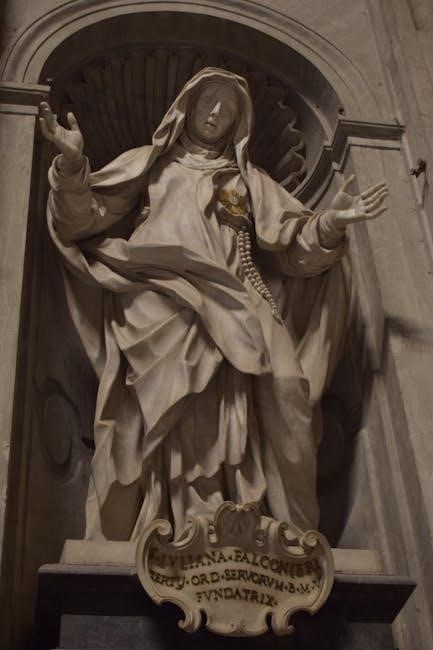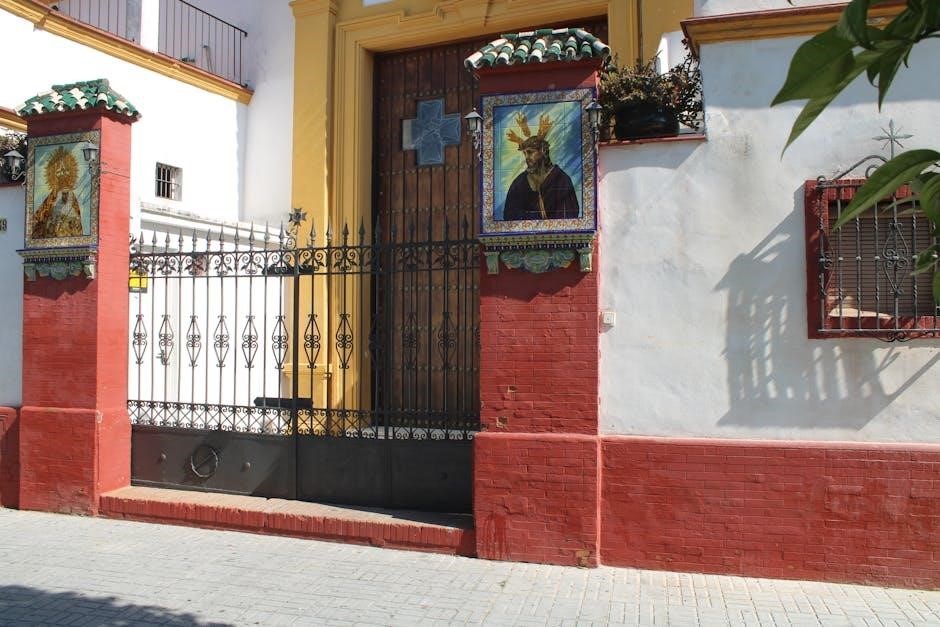Pre-Cana is a Catholic marriage preparation program rooted in the Wedding at Cana. It provides spiritual and practical guidance for couples, fostering a strong sacramental union.
1.1 Biblical Background: The Wedding at Cana
The Wedding at Cana, as recounted in John 2:1-11, is the biblical foundation of the Pre-Cana program. Jesus’ first miracle, turning water into wine, symbolizes God’s transformative grace in marriage. Mary’s intercession highlights the importance of faith and prayer in marital relationships. This event underscores the sacramental nature of marriage, reflecting the union between Christ and his Church. The story serves as a spiritual cornerstone for Catholic marriage preparation, emphasizing faith, love, and the divine presence in the covenant of marriage.
1.2 Purpose of Pre-Cana in Catholic Marriage Preparation
Pre-Cana is designed to prepare couples for the sacrament of marriage, fostering a deeper understanding of the commitment they are about to undertake. It provides spiritual guidance, practical advice, and tools to strengthen relationships. The program emphasizes the sacramental nature of marriage, encouraging couples to build a faith-centered life together. By exploring values, communication, and shared goals, Pre-Cana equips couples to navigate challenges and grow in love and mutual respect, aligning with the Church’s teachings on the sanctity of marriage.
1.3 Overview of the Pre-Cana Program Structure
The Pre-Cana program typically includes a combination of meetings with a priest, retreats, and workshops. Couples engage in discussions about their relationship, faith, and future goals. The program often involves completing a pre-nuptial questionnaire and participating in assessments to identify strengths and areas for growth. Retreats provide a reflective environment for spiritual preparation, while meetings with clergy ensure alignment with Catholic teachings. This structured approach ensures couples are well-prepared for the sacrament of marriage and its lifelong commitments.

The Pre-Nuptial Questionnaire
The Pre-Nuptial Questionnaire is a detailed form completed by couples before marriage. It covers topics like faith, family, and relationship dynamics, aiding spiritual and marital preparation.
2.1 Overview of the Pre-Nuptial Questionnaire
The Pre-Nuptial Questionnaire is a comprehensive document couples complete before marriage. It covers faith, family background, relationship dynamics, and future plans. The questionnaire is designed to help couples reflect on their values, goals, and beliefs. It also addresses practical aspects like financial planning and conflict resolution; The form is typically filled out separately by each partner and reviewed with the priest. This process ensures openness and understanding, aiding the priest in assessing the couple’s readiness for a sacramental marriage and their commitment to faith.
2.2 Process of Filling Out the Questionnaire
The Pre-Nuptial Questionnaire is typically completed individually by each partner before meeting with the priest. Couples are advised to answer honestly and thoroughly, ensuring all questions are addressed. Once filled out, the questionnaire is signed and submitted to the priest for review. This process allows the priest to understand the couple’s beliefs, values, and readiness for marriage. The completed questionnaire is then discussed during pre-marriage counseling sessions, helping to identify areas for further reflection or preparation.
2.3 Key Questions Covered in the Questionnaire
The Pre-Nuptial Questionnaire covers essential topics such as the couple’s understanding of Catholic teachings on marriage, family background, and financial readiness. It also addresses faith practices and expectations for raising children in the Catholic faith. Questions about previous relationships, marital intentions, and willingness to fulfill sacramental obligations are included. Additionally, it explores areas like communication styles, conflict resolution, and mutual respect. The questionnaire aims to ensure both partners are aligned in their commitment to a lifelong, sacramental marriage.
Required Documents for Pre-Cana
Key documents include baptism certificates for Catholic parties, affidavits of freedom to marry, and dispensations for mixed marriages; These ensure eligibility and proper sacramental preparation.
3.1 Baptism Certificates for Catholic Parties
A baptism certificate is required for each Catholic party, dated within six months of beginning the marriage preparation process. This document confirms the individual’s Catholic faith and sacramental status. It must be obtained from the parish where the baptism took place; The certificate includes details such as the date and place of baptism, as well as the officiating priest’s name. For non-Catholic baptized parties, a copy of their baptism certificate is also needed to ensure eligibility for the sacrament of marriage.
3.2 Affidavits of Freedom to Marry
An affidavit of freedom to marry is a sworn statement confirming that both parties are free to enter into a valid marriage. This document ensures there are no legal or canonical impediments. Both the Catholic and non-Catholic parties must sign it, attesting to their freedom from prior marriages, annulments, or other binding commitments. Witnessed by a priest or notary, this affidavit is a critical step in verifying the couple’s eligibility to marry within the Catholic Church, ensuring the sacrament’s validity and integrity.
3.3 Dispensations for Mixed Marriages
Dispensations for mixed marriages are required when a Catholic marries a non-Catholic. The Catholic party must obtain permission from the Church, ensuring they understand their obligation to raise future children in the Catholic faith. The non-Catholic spouse must be informed of this commitment. This dispensation, typically granted by the bishop, acknowledges the couple’s commitment to a sacramental union while respecting the non-Catholic’s beliefs. It is a necessary step to ensure the marriage aligns with Catholic teachings and maintains the integrity of the sacrament.

Marriage Preparation Process
The marriage preparation process involves meetings with the priest, Pre-Cana retreats, and psychological assessments. It aims to strengthen the couple’s faith and readiness for the sacrament of marriage.
4.1 Meetings with the Priest
Meetings with the priest are a cornerstone of the marriage preparation process. These sessions provide an opportunity for the couple to discuss their relationship, faith, and readiness for marriage. The priest guides the couple through the pre-nuptial questionnaire, ensuring they understand the sacrament’s commitments. Key topics include communication, shared values, and future goals. The priest also assesses the couple’s understanding of Catholic teachings and their willingness to raise children in the faith. These meetings foster spiritual growth and practical readiness for a lifelong union.
4.2 Pre-Cana Retreats and Workshops
Pre-Cana retreats and workshops are integral to Catholic marriage preparation. These sessions, often held over a weekend or day, provide a reflective environment for couples to deepen their understanding of marriage. They include talks, group discussions, and activities focused on communication, finances, and faith. Retreats emphasize spiritual growth, fostering a stronger connection between partners. Workshops may also address practical aspects of marriage, equipping couples with tools to navigate challenges. These experiences encourage open dialogue and mutual support, laying a solid foundation for a lifelong commitment.
4.3 Psychological and Relationship Assessments
Psychological and relationship assessments are tools used in Pre-Cana to evaluate a couple’s compatibility and readiness for marriage. Inventories like the FOCCUS or PREPARE are commonly administered. These assessments identify strengths and areas for growth, fostering open communication. Couples complete them individually and discuss results with a facilitator. This process helps address potential issues early, promoting emotional and relational preparedness. The goal is to build a resilient, faith-centered marriage by enhancing understanding and conflict resolution skills.

Sacrament of Marriage in the Catholic Church
Marriage is a sacrament where a man and woman commit to a lifelong, exclusive union. It reflects God’s love and is a divine vocation for mutual support.
5.1 Theology of Marriage as a Sacrament
Marriage, as a sacrament, is a divine institution reflecting God’s love. It unites a man and woman in a lifelong, exclusive bond, symbolizing Christ’s love for the Church (Ephesians 5:25-33). The sacrament is rooted in mutual consent, fidelity, and openness to life. Through it, couples receive grace to live their vows faithfully. The Catholic Church teaches that marriage is a covenant, not just a contract, and that it is ordained by God for the holiness and unity of the spouses.
5.2 Role of Faith in the Marriage Preparation
Faith is central to Catholic marriage preparation, guiding couples to understand the sacrament’s divine nature. It provides a moral and spiritual framework for their relationship, emphasizing love, commitment, and sacrifice. Through prayer, reflection, and shared values, faith strengthens their bond and helps them navigate life’s challenges together. The internet highlights faith’s role in fostering unity and mutual support, ensuring couples are spiritually prepared for their lifelong journey together.
5.3 Raising Children in the Catholic Faith
Raising children in the Catholic faith is a key aspect of Catholic marriage preparation. Couples are encouraged to commit to nurturing their children’s spiritual growth. The Catholic party must sign a promise to raise their children in the faith, ensuring continuity of Catholic values. This commitment reflects the Church’s emphasis on family as a domestic church. The internet highlights the importance of faith formation, reinforcing the role of parents as spiritual guides for their children.

Challenges and Considerations
Challenges in Catholic marriage preparation include interfaith issues, cohabitation, and relationship conflicts, which require open dialogue and commitment to faith values and Church teachings.
6.1 Interfaith Marriages and Their Implications
Interfaith marriages present unique challenges, requiring careful consideration of religious beliefs and practices. The Catholic party must sign a promise to raise children in the Catholic faith, ensuring they are baptized and nurtured within the Church. The non-Catholic spouse must be informed of this commitment. Open dialogue between the couple and the priest is essential to address potential conflicts and ensure mutual understanding. The Church encourages respect for both traditions while upholding Catholic teachings, fostering a harmonious and faith-centered marriage.
6;2 Cohabitation Before Marriage
Cohabitation before marriage is a common modern practice that raises important discussions in Catholic marriage preparation. The Church encourages couples to reflect on the spiritual and practical implications of living together before vows. Pre-Cana programs address concerns about intimacy, commitment, and financial responsibilities, emphasizing the sacramental understanding of marriage. Couples are guided to consider the meaning of their union as a lifelong covenant. The Church recommends maintaining separate residences until marriage, but if cohabiting, couples must discuss their situation openly with the priest and seek guidance.
6.3 Addressing Potential Relationship Issues
Pre-Cana programs emphasize identifying and addressing potential relationship issues early in marriage preparation. Couples are encouraged to openly discuss finances, communication styles, and conflict resolution. The questionnaire highlights areas such as shared values, family expectations, and personal goals. Through guided discussions with priests or facilitators, couples explore ways to strengthen their relationship and build a strong foundation for marriage. The Church encourages addressing these issues to foster mutual understanding and a lifelong commitment rooted in faith and love.
Pre-Cana equips couples with tools for a lifelong, faith-centered marriage. By fostering communication, understanding, and commitment, it strengthens relationships, ensuring a solid foundation for a sacramental union.
7.1 Importance of Pre-Cana in Building a Strong Marriage
Pre-Cana is essential for fostering a strong, faith-centered marriage. It equips couples with tools to communicate effectively, resolve conflicts, and deepen their commitment to one another. By exploring values, goals, and spiritual beliefs, couples build a solid foundation for lifelong unity. The program emphasizes the sacramental nature of marriage, encouraging couples to view their relationship as a reflection of God’s love. This preparation not only strengthens interpersonal bonds but also nurtures a shared vision for a harmonious and enduring marital journey.
7.2 Final Thoughts on Catholic Marriage Preparation
Catholic marriage preparation, culminating in the Pre-Cana program, is a transformative journey that nurtures spiritual growth, communication, and mutual understanding. It underscores the sacramental nature of marriage, emphasizing faith, commitment, and unity. By addressing practical and emotional aspects of relationships, Pre-Cana equips couples to navigate life’s challenges together. The program’s holistic approach fosters a deep appreciation for the lifelong covenant of marriage, ensuring couples are well-prepared to build a strong, faith-centered family. Ultimately, it reaffirms marriage as a sacred vocation and a reflection of God’s enduring love.
